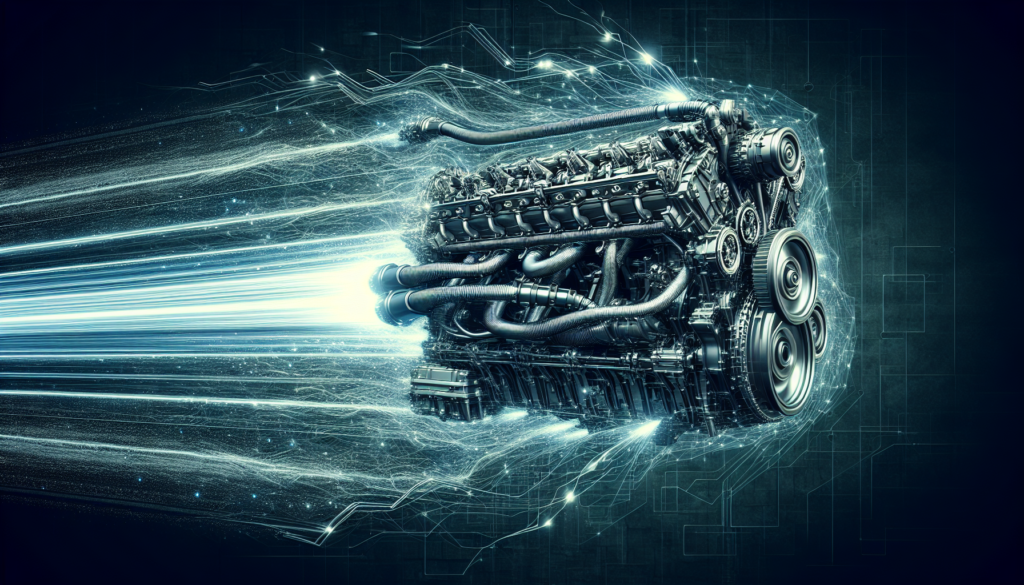Ready to take your boating experience to the next level? Look no further than the Ultimate Guide to boat engine upgrades. Whether you’re a seasoned captain or a casual enthusiast, this comprehensive guide will walk you through the world of boat engine upgrades, from the basics to the advanced. Discover how upgrading your boat’s engine can enhance performance, fuel efficiency, and overall enjoyment on the water. With practical tips, expert advice, and helpful recommendations, this guide is a must-read for anyone looking to optimize their boating experience. So, sit back, relax, and get ready to propel your boat into a new realm of power and performance.
Choosing the Right Engine
When it comes to boat engine upgrades, one of the first and most crucial decisions you’ll need to make is choosing the right engine. This decision will depend on your boat’s needs and the specific requirements you have in mind.
Evaluate your boat’s needs
Before diving into the world of engine upgrades, take a moment to evaluate your boat’s needs. Consider factors such as the type of boating you’ll be doing, the weight of your boat, and the distance you typically travel. These factors will help you determine the power and torque requirements of your engine.
Consider the different engine types
Boat engines come in various types, each with its own advantages and disadvantages. Some of the most common engine types include outboard, inboard, and sterndrive engines. Outboard engines, for example, are versatile and can be easily maneuvered, while inboard engines offer increased power and efficiency. Research each type to determine which one is best suited for your boating needs.
Assess the power and torque requirements
Power and torque are both important factors to consider when choosing an engine. Power refers to the ability to generate speed, while torque determines the capacity of the engine to move the boat efficiently. Assess the power and torque requirements based on your boating activities and ensure your chosen engine is capable of meeting those demands.
Evaluating Performance Upgrades
If you’re looking to enhance the performance of your boat, considering performance upgrades is a great option. However, before diving into these upgrades, it’s important to understand their significance and the potential impact they can have.
Understanding the importance of upgrading
Performance upgrades can greatly improve the overall speed, acceleration, and efficiency of your boat. By investing in the right upgrades, you can enjoy a more thrilling and enjoyable boating experience. It’s important to recognize the benefits of upgrading and the positive impact it can have on your boat’s performance.
Researching available performance upgrades
Before selecting any specific upgrades, it’s crucial to conduct thorough research. Look into the various performance upgrades available in the market and understand how they can improve your boat’s performance. From propeller upgrades to exhaust system enhancements, there are a plethora of options to consider based on your specific needs and budget.
Considering the impact on fuel consumption
Upgrading your boat’s engine performance can also have an impact on fuel consumption. While increased power and speed are desirable, it’s important to assess how these upgrades can affect your boat’s fuel efficiency. Strike a balance between performance and fuel consumption to ensure that your upgrades align with your desired outcomes.
Assessing the effects on speed and acceleration
One of the main reasons for considering performance upgrades is to enhance your boat’s speed and acceleration capabilities. Research and analyze the potential effects each upgrade can have on these aspects. Keep in mind that some upgrades may focus more on speed, while others may focus on acceleration. Determine your priorities and select upgrades that align with your desired performance enhancements.

Upgrading to Fuel Injection
fuel injection systems have become increasingly popular among boat owners due to their numerous benefits. Before making the switch, it’s important to understand the advantages, types, costs, and installation considerations associated with fuel injection upgrades.
Benefits of fuel injection
Fuel injection systems offer several advantages over traditional carbureted systems. They provide improved fuel efficiency, smoother acceleration, and better performance at higher altitudes. Fuel injection also eliminates the need for manual fuel adjustments, making engine operation more convenient.
Types of fuel injection systems
There are several types of fuel injection systems available, including throttle body injection (TBI) and multipoint fuel injection (MPFI). TBI is a simpler and less expensive option, while MPFI offers individual fuel injectors for each cylinder, providing more precise fuel distribution. Research each type to determine which suits your boat’s needs and budget.
Considering the cost
Cost is a significant factor to consider when upgrading to fuel injection. While the initial investment may be higher than a carbureted system, the long-term benefits and potential fuel savings should also be taken into account. Assess your budget and weigh the cost against the advantages of improved performance and fuel efficiency.
Installation and maintenance considerations
Before upgrading to fuel injection, it’s important to understand the installation and maintenance requirements. Fuel injection systems are more complex than carbureted systems, so installation may require professional assistance. Additionally, regular maintenance and tuning will be necessary to ensure optimal performance. Evaluate whether you have the necessary skills or resources to handle installation and ongoing maintenance.
Supercharging versus Turbocharging
If you’re looking for a significant boost in power and performance, supercharging and turbocharging are two popular options to consider. Understanding the differences, pros, and cons can help you determine which option is best for your boat.
Understanding supercharging and turbocharging
Supercharging and turbocharging both involve compressing air to increase the amount of oxygen available for combustion in the engine. Superchargers are driven by a belt connected to the engine, while turbochargers utilize the engine’s exhaust gases to power a turbine. The compressed air from both systems results in increased power and performance.
Pros and cons of supercharging
Superchargers offer instant power delivery, as they are directly driven by the engine, resulting in enhanced acceleration and throttle response. They also provide consistent power across all RPM ranges. However, superchargers consume engine power to operate, which may slightly reduce overall efficiency and fuel economy.
Pros and cons of turbocharging
Turbochargers utilize otherwise wasted exhaust gases to power the turbine, resulting in increased power without drawing energy from the engine itself. This can lead to improved fuel efficiency compared to superchargers. However, turbochargers may experience lag before providing full boost, and the increased complexity can result in higher installation and maintenance costs.
Determining the best option for your boat
Selecting between supercharging and turbocharging will depend on your specific requirements and preferences. Consider factors such as budget, desired power increase, and your boating style. Research different kits available for your engine and consult with professionals to determine which option is best suited for your boat.

Upgrading to a Diesel Engine
Diesel engines offer several advantages over their gasoline counterparts, including increased torque, better fuel efficiency, and enhanced durability. Before making the switch, it’s important to assess the advantages, considerations, and potential impact on performance.
Advantages of diesel engines
Diesel engines provide higher torque and better low-end power, making them ideal for heavy loads and towing. They are also known for their fuel efficiency, particularly at lower speeds, which can result in significant savings in fuel costs. Additionally, diesel engines tend to have a longer lifespan and require less maintenance compared to gasoline engines.
Considerations for switching to diesel
Switching to a diesel engine requires careful consideration. Assess the availability of diesel fuel in your area, as it may not be as widely accessible as gasoline. Additionally, diesel engines tend to have a higher upfront cost compared to gasoline engines. Evaluate whether the long-term benefits of increased torque and fuel efficiency outweigh the initial investment.
Assessing the cost and maintenance
While diesel engines offer long-term savings in terms of fuel economy, it’s important to evaluate the initial cost and ongoing maintenance requirements. Diesel engines can be more expensive to purchase and install, so consider your budget and long-term financial goals. Additionally, diesel engines may require specialized maintenance and servicing, so factor in these costs as well.
Evaluating the impact on performance
Diesel engines provide superior torque and low-end power compared to gasoline engines. However, they may not excel in terms of high-end speed and acceleration. Consider your boating needs and determine whether the increase in torque and fuel efficiency outweighs any potential sacrifices in top speed or acceleration.
Enhancing Cooling Systems
Efficient cooling is vital for proper engine performance and longevity. Upgrading your boat’s cooling system can help maintain optimal operating temperatures and prevent overheating. Understanding the importance, types, and considerations of cooling systems will help you make an informed decision.
Importance of efficient cooling
Proper cooling is essential for preventing engine damage and ensuring optimal performance. Engines generate a significant amount of heat during operation, and a cooling system helps dissipate this heat to maintain an optimal operating temperature. Without efficient cooling, the engine can overheat, leading to decreased performance, increased wear and tear, and potential breakdowns.
Types of cooling systems
There are two main types of cooling systems used in boat engines: raw water cooling and closed circuit cooling. Raw water cooling systems utilize seawater to cool the engine, while closed circuit cooling systems use a separate coolant that circulates through the engine. Each system has its own advantages and considerations, so research and understand the differences for your specific boating needs.
Choosing the right cooling system for your boat
Selecting the appropriate cooling system for your boat will depend on several factors, including the type of engine you have, the water conditions you typically navigate, and your budget. Consider the advantages and disadvantages of each system and consult with professionals or fellow boaters to determine which cooling system suits your needs.
Installation and maintenance considerations
Upgrading your cooling system may require professional assistance, particularly if you are switching between different types of systems. Ensure that you have the necessary skills and knowledge to install the new cooling system properly. Additionally, regular maintenance and cleaning of the cooling system are essential to keep it operating efficiently. Take these factors into account before upgrading and consider the ongoing maintenance requirements.

Improving Exhaust Systems
An often overlooked aspect of boat engine upgrades, the exhaust system plays a crucial role in performance and efficiency. Upgrading your exhaust system can lead to improved power, reduced engine noise, and increased fuel efficiency.
Understanding the role of exhaust systems
The exhaust system is responsible for removing exhaust gases from the engine and improving the overall performance of the boat. A properly functioning exhaust system ensures efficient combustion, reduces backpressure, and minimizes engine noise. Upgrading your exhaust system can optimize these factors and contribute to enhanced boat performance.
Types of exhaust systems
There are several types of exhaust systems available, including through-hull exhausts, transom exhausts, and underwater exhausts. Each system has its own advantages and considerations. Through-hull exhausts provide maximum power and performance but may be noisier, while underwater exhausts offer quieter operation but may sacrifice some power. Research the different options and select the one that aligns with your performance goals and boating preferences.
Benefits of upgrading the exhaust system
Upgrading your exhaust system can offer several benefits. Enhanced airflow and reduced backpressure can lead to increased power, improved acceleration, and better fuel efficiency. Upgraded systems may also provide a more pleasant boating experience by minimizing engine noise and exhaust fumes. Consider these advantages when evaluating whether to upgrade your boat’s exhaust system.
Considerations for installation and maintenance
Upgrading your exhaust system may require professional installation, particularly if significant modifications are needed. Ensure that you have the necessary skills or access to professional assistance. Additionally, regular maintenance and inspection will be necessary to ensure the exhaust system operates optimally. Take these factors into consideration and assess whether you have the resources and commitment for proper installation and ongoing maintenance.
Choosing the Right Propeller
The propeller is a critical component of your boat’s performance, as it directly affects the speed, acceleration, and maneuverability. Selecting the correct propeller for your boat is crucial to maximize performance and efficiency.
Importance of the correct propeller
The propeller is essentially a rotating wing that creates propulsion by converting engine power into thrust. Choosing the right propeller is vital to ensure that your boat operates at its peak performance. An ill-fitting propeller can result in reduced speed, poor maneuverability, and even engine damage. Give careful consideration to the selection process to optimize your boat’s performance.
Types of propellers available
Propellers come in different sizes, shapes, and materials, each with its own characteristics and performance benefits. Three-blade propellers are the most common and generally offer a balance between speed and acceleration. Four-blade propellers provide improved acceleration and maneuverability but may sacrifice some top speed. Consider factors such as boat weight, engine power, and your performance requirements when selecting the appropriate propeller type.
Factors to consider when selecting a propeller
Several factors should be considered when choosing a propeller for your boat. These include pitch, diameter, and material. Pitch refers to the distance the propeller will travel through the water in one complete revolution. Diameter affects the amount of grip the propeller has on the water. Material options include aluminum, stainless steel, and composite, each with its own benefits in terms of strength, durability, and cost. Evaluate these factors based on your boat’s needs and desired performance outcomes.
Potential impact on boat performance
Selecting the right propeller can have a significant impact on your boat’s performance. Choosing a propeller that is too large or with the wrong pitch can result in decreased acceleration and reduced top speed. Conversely, selecting a propeller with the appropriate size and pitch can enhance performance and fuel efficiency. Take the time to research and experiment with different propeller options to find the best fit for your boat.

Upgrading Electrical Systems
Upgrading your boat’s electrical systems can enhance safety, convenience, and overall functionality. From batteries to charging systems, understanding the benefits and considerations of electrical upgrades is essential.
Benefits of upgrading electrical systems
Upgrading your boat’s electrical systems can offer several advantages. It can enhance safety through improved lighting, navigation equipment, and communication systems. Upgraded electrical systems can also provide increased convenience, such as charging stations for electronic devices or improved audio and visual entertainment systems. Assess your boat’s electrical needs and consider the potential benefits of upgrading.
Assessing the capacity and requirements
Before upgrading your electrical systems, it’s important to assess the current capacity and requirements. Determine the power demands of your boat’s electrical components, such as lighting, navigation equipment, and various appliances. Evaluate whether your existing electrical system can handle these demands or if an upgrade is necessary to avoid potential issues or overloaded circuits.
Choosing the right batteries and charging systems
Selecting the appropriate batteries and charging systems is crucial for reliable and efficient performance. Consider factors such as battery type (lead-acid, AGM, lithium-ion), capacity, and maintenance requirements. Research different charging systems, such as alternators or solar panels, to determine which option best suits your boat’s needs. Consult with professionals or fellow boaters to ensure you select the right batteries and charging systems for your electrical upgrade.
Installation considerations
Upgrading your boat’s electrical systems may require proper installation to ensure optimal performance and safety. Depending on the complexity of the upgrade, professional assistance may be necessary. Ensure that you have the necessary skills and knowledge to handle the installation process. If in doubt, consult with experts to ensure the upgrades are installed correctly and up to industry standards.
Regular Maintenance and Upkeep
Even with all the upgrades, regular maintenance and upkeep are essential to keep your engine in top condition. Neglecting maintenance tasks can lead to decreased performance, increased fuel consumption, and potential breakdowns. Follow these tips to keep your engine running smoothly.
Importance of regular maintenance
Regular maintenance is the key to keeping your engine in optimal condition. It helps identify and address potential issues before they become major problems. Routine maintenance ensures proper lubrication, cooling, and fuel delivery, maximizing performance and minimizing the risk of engine damage. Make a habit of performing regular maintenance tasks to keep your engine running smoothly.
Components to check and service regularly
Several components require regular maintenance to ensure they are functioning properly. These include oil and filter changes, spark plug inspection and replacement, fuel system cleaning, and regular checks of belts, hoses, and other engine components for wear and tear. Follow the manufacturer’s recommended maintenance schedule and perform these tasks at the specified intervals.
Recommended maintenance schedule
Every boat engine has its own specific maintenance requirements, so it’s important to consult the owner’s manual provided by the manufacturer. The manual will outline the recommended maintenance schedule, including tasks and intervals specific to your engine. Adhere to the recommended schedule and keep a record of the maintenance performed for future reference.
Tips for keeping the engine in top condition
In addition to regular maintenance, there are several tips to keep your engine in top condition. Avoid excessive idling, as it can cause carbon buildup and reduce performance. Use high-quality fuel and consider fuel additives to clean the system and improve efficiency. Keep an eye on the engine’s temperature and avoid prolonged overheating. Additionally, be mindful of any unusual noises or vibrations and address them promptly to prevent further damage.
Keeping your boat engine in top condition requires a combination of regular maintenance, proper upgrades, and careful attention to the specific needs of your watercraft. By evaluating your boat’s needs, understanding the available upgrades, and maintaining a consistent maintenance schedule, you can ensure that your engine performs optimally, providing you with a safe and enjoyable boating experience.


